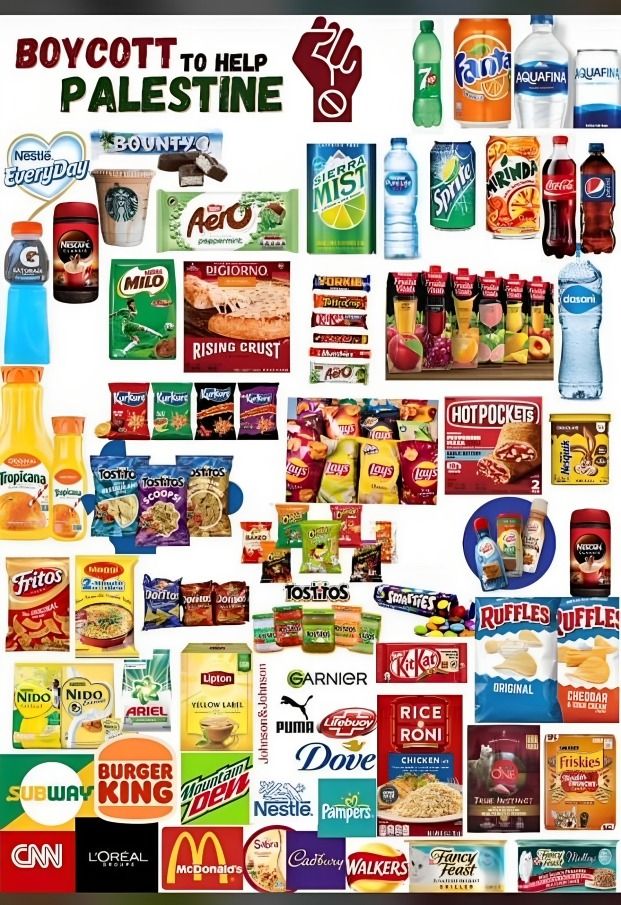List of Israeli Products | Please boycott Israeli Products🚫⛔

In a world driven by consumer choices, expressing solidarity with oppressed communities goes beyond rallies and protests. To truly make a lasting impact, consider hitting where it hurts the most for nations that engage in controversial practices – their economy. As the Israeli-Palestinian conflict continues to draw international attention, some advocate for an economic boycott of products associated with Israel.

Here is a list of products to be mindful of and alternatives to consider:
**Plastics:**
– Keter
– OutStanding
– LipSki
– AlliBERT
– Contico
– Jardin
– Curver
**Food & Drink:**
– Danone
– Actimel
– Activia
– Shape
– Evian
– Volvic
– Dr Pepper
– Fanta
– Sunkist
– Fruitopia
– Lilt
– Kia Ora
– Sprite
– Schweppes
– Nescafe
– Perrier
– Nesquik
– Aero
– KitKat
– Yorkie
– Polo
– Quality Street
– Rowntree
– Maggi
– Smarties
– Cheerios
– Shreddies
– Buitoni
– Carnation
– Nestea
– Purina
– McDonald’s
– Starbucks
– Coca-Cola
– Nestle
**Others:**
– Osem
– Strauss
– Eden
– Jaffa
– Tivall
– SodaStream
**Fruits and Vegetables:**
Israeli fruit, vegetables, and herbs are commonly found in major retail stores. Be sure to check labels and avoid products from Israel and the West Bank. Additionally, steer clear of Israeli dates.
– Mehadrin
– Arava
– Carmel Agrexco
– Edom
– Carmy
– Tali
– AdaFresh & Shoham
**Dates:**
– Jordan River
– Hadiklaim
– Tamara
– King Solomon
– Jordan Plains
– Karsten Farms/Kalahari
– Bomaja
**Toys to Avoid:**
– Interstar
– Edushape
– Taf Toys
– Tiny Love
– Rummikub
– Halilit
**Technology:**
– Motorola
– Intel
– IBM
– HP
– AOL
– Siemens
**Cosmetics & Health Care:**
– Kimberly-Clark
– Kleenex
– Andrex
– Kotex
– Huggies
– MAC
– La Mer
– Sean John
– Aramis
– Bumble and bumble
– Michael Kors
– Perspectives
– Bobbi Brown
– Flirt
– Lab Series
– American Beauty
– Ojon
– Darphin
– Donna Karan
– Clinique
– Origins
– Tom Ford
– GoodSkin Labs
– Aveda
– Smashbox
– Zegna
– Kiton
– Jo Malone
– Grassroots
– Softsheen Carson
– Maybelline
– Redken
– Kiehl’s
– Viktor & Rolf
– Giorgio Armani
– Diesel
– Mizani
– Vichy
– Ralph Lauren
– Garnier
– La Roche-Posay
– Matrix
– Shu Uemura
– Biotherm
– Cacharel
– Kerastase
– Estee Lauder
– L’Oreal
It is important to note that taking part in an economic boycott is a personal choice, and individuals should thoroughly research and consider the diverse perspectives surrounding this matter. The aim is to encourage dialogue and awareness about the impact of consumer choices on global conflicts.
Understanding the Sentiment: Muslims around the world share a common bond of brotherhood and a commitment to social justice. The call to boycott Israeli products stems from a belief that economic pressure can be a powerful tool to influence change. It is seen as a peaceful means of expressing dissent and drawing attention to the ongoing Israeli-Palestinian conflict.
Economic Impact: Proponents of the boycott argue that by refusing to support Israeli products, Muslims can contribute to a tangible economic impact. This impact is believed to send a strong message, urging Israel to reconsider its policies and actions in the occupied territories.
Solidarity with Palestine: Boycotting Israeli products is viewed as a symbolic act of solidarity with the Palestinian people, who have faced decades of conflict and displacement. Muslims see it as a way to stand by those who are oppressed and to advocate for the rights and dignity of the Palestinian population.
Non-Violent Protest: The call for boycotting Israeli products emphasizes the importance of non-violent protest. It aligns with the principles of Islam, promoting peaceful means of advocating for justice and human rights. By choosing not to purchase Israeli goods, Muslims aim to make their voices heard without resorting to aggression.
Global Awareness: The boycott is not merely about personal choice; it is a collective effort to raise global awareness about the Israeli-Palestinian conflict. Muslims who participate in the boycott hope to stimulate conversations, encourage informed decision-making, and foster a sense of responsibility among consumers worldwide.
In conclusion, the call for boycotting Israeli products from a Muslim perspective is grounded in a commitment to justice, empathy for the oppressed, and a belief in the power of peaceful protest. It reflects the desire to contribute, in a meaningful way, to the ongoing efforts for a just resolution to the Israeli-Palestinian conflict.
